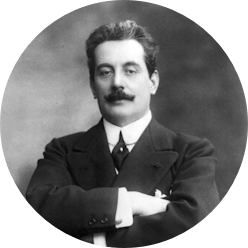
Giacomo Puccini
December 22, 1858 - Lucca (Italy) — November 29, 1924 - Bruxelles (Belgium)
About
Giacomo Puccini: birth of a vocation.
Puccini, the most famous opera composer in the world was born into a family of musicians. As a child, he studied singing and the organ before attending a performance of Aida, which would turn out to be a true revelation for the composer. A vocation was born; Puccini was almost solely a composer of opera. In 1884, at the end of his studies, he gave a performance of his opera, The Fairies, which was quickly produced at the Scala.
Giacomo Puccini's work
Considered as following in the tradition of Giuseppe Verdi, Manon Lescaut (1893) brought the composer fame beyond the frontiers of Italy. Puccini began to master opera. He called upon good librettists and composed works whose success would be resounding: La Bohème, Tosca (greatly admired by Arnold Schoenberg), Madame Butterfly. He became rich and divided his time between composition, hunting and sports cars.
After briefly turning to operetta, La Rondine (1917), in 1918 Puccini produced his great masterpiece, his trilogy, the Triptych. He was accustomed to describing it as “Without melody, fresh and poignant, it is not an opera”. The composer therefore based his conception of music on fundamental emotions and composed works where the art of beautiful song seemed innate. The lyrical surges are irresistible, sustained by a superbly harmonic backcloth. Beneath the apparent simplicity or evidence of his music, Puccini left complex works. Frequently the key “bursts” according to Schoenberg. The dramatic efficiency of his works is remarkable and his orchestration always voluptuous. Puccini succumbed to cancer in 1924 leaving one of his most daring operas, Turandot, unfinished.

